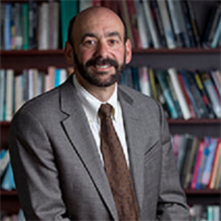Two School of Education professors recognized as nation's most influential
Frederick Hess named UCI School of Education Professor Richard Arum and Distinguished Professor Greg Duncan to his annual RHSU Edu-Scholar Public Influence Rankings.
The list recognizes 200 university-based scholars in the U.S. who had the biggest influence on educational practice and policy last year, moving ideas from academic journals into the national conversation. Hess estimates there are more than 20,000 university-based faculty nationwide who were eligible for his list, meaning that his final list of 200 represents the top one percent.
2022 represents the third consecutive year in which both Arum and Duncan have been named to the annual list.
The list recognizes 200 university-based scholars in the U.S. who had the biggest influence on educational practice and policy last year, moving ideas from academic journals into the national conversation. Hess estimates there are more than 20,000 university-based faculty nationwide who were eligible for his list, meaning that his final list of 200 represents the top one percent.
2022 represents the third consecutive year in which both Arum and Duncan have been named to the annual list.
|
Arum is the principal investigator of the UCI Measuring Undergraduate Success Trajectories (UCI-MUST) project, a state-of-the-art measurement project that is improving our understanding of the value of undergraduate educational experiences and promoting evidence-based models of undergraduate student success. The project tracks a random sample of more than 1,200 undergraduate UCI students, collecting data on transcripts, online classroom behavior, living situations, student moods and more.
In December, Arum and his project team published an article, A Framework for Measuring Undergraduate Learning and Growth in Change: The Magazine of Higher Learning. Utilizing a measurement framework that includes six dimensions – Cognitive ability and intellectual dispositions; development of identity and adaptive life-course agency; self-regulation skills; social capital; civic engagement; and mental health and psychological flourishing – the project team argued that the value of postsecondary education is derived from its relationship not only to a narrow set of skills related to occupational training, but also to broad aspects of human development that include cognitive, psychological, social, and civic characteristics. |
In May, Arum’s research team contributed to the Gates Foundation Postsecondary Value Commission with a report, Ensuring a More Equitable Future: Assessing Student Learning and Growth in Higher Education.” The report discusses how to measure aspects of undergraduate student growth and development, which can provide a framework for identifying the value of attending postsecondary institutions.
From 2016-21, Arum served as dean of the UCI School of Education, overseeing the school’s meteoric growth in faculty recruitment, research, graduate student applications, community partnerships, national rankings, and more.
From 2016-21, Arum served as dean of the UCI School of Education, overseeing the school’s meteoric growth in faculty recruitment, research, graduate student applications, community partnerships, national rankings, and more.
|
An economist by training, Duncan’s research focuses on child development and learning, and ways to make educational trajectories more positive, especially for kids with disadvantaged backgrounds.
He is one of three principal investigators on a $7.86 million grant – funded in part by the National Institute of Child Health and Development – investigating the impact of poverty reduction on child well-being. The project distributes disparate amounts of monthly cash payments to mothers and their newborns with incomes below the federal poverty threshold. One group of mothers selected at random receives $333 a month in cash payments for the first 40 months of the child’s life, the other group receives $20 a month. In January 2022, Duncan and his research team published a paper in the Proceedings of the National Academy of Sciences, that details their study’s findings after tracking mothers and their infants from age 0 – 12 months. They found that after one year of monthly cash support, infants in low-income families were more likely to show brain activity patterns that have been associated with the development of higher cognitive skills. |
It is the first causal study to test the connections between poverty reduction and brain development among very young children and to provide important evidence about the likely effects of tax and income-enhancement policies for young children, such as the Child Tax Credit, and related social policies designed to enhance family economic stability and well-being.
Hess is a resident scholar at the American Enterprise Institute and the director of the think tank’s Education Policy Studies. Established in 2010, this is the 12th annual edition of the RHSU Edu-Scholar Public Influence Rankings.
You can view the rankings in their entirety here.
Hess is a resident scholar at the American Enterprise Institute and the director of the think tank’s Education Policy Studies. Established in 2010, this is the 12th annual edition of the RHSU Edu-Scholar Public Influence Rankings.
You can view the rankings in their entirety here.



